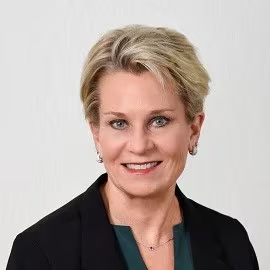““The greatest joy I receive is working with family members as they navigate making critical decisions during the planning process that will impact their legacy story.”
Julie Ann Buschman
Senior Fiduciary Officer
PyxisCare Management is proud to work with expert service providers and advisors on a daily basis to ensure that a range of client needs are met. Julie Ann Buschman, a Senior Fiduciary Officer at Northern Trust, is an trust officer who brings a unique perspective to serving the complex needs of trust clients while navigating a complex health journey. Learn more about how Julie’s personal journey has impacted her perspective and depth of care.
Why is establishing trust crucial when working with families on legacy planning?
In my role as a fiduciary advisor for almost 38 years, I learned that without gaining a personal connection of trust in which a client will truly share their deepest personal goals and fears, we can’t do our best for them. It takes time and personal investment to gain this level of trust. It also means we have to be vulnerable ourselves.
How has your cancer journey influenced your approach to working with clients?
Trust is a two way relationship. After receiving my own cancer diagnosis 16 years ago, one in which I couldn’t hide, I learned that my conversations with clients naturally became more open and deeper. Navigating a health crisis while working significant hours is more than a bit of a challenge. I didn’t want to fail the clients I served during this time, in fact serving them gave me the distraction I needed to avoid focusing on my own situation. I remember confirming meetings with clients prior to traveling and sharing with them that I had a different “look”, but no worries, everything was fine. I didn’t talk about it, I simply did what I had to each day, all while working through stage 4 cancer treatment. In some ways, not comprehending the challenge I had ahead of me was helpful. I am certain I couldn’t repeat this approach today.
How do you guide clients and families through emotionally challenging decisions?
In the past decade, I found my voice and do not avoid what may be considered awkward, uncomfortable conversations when working with the families I serve. I stared at mortality and know the questions that need to be asked to make sure that our advice works through all of life’s events. Helping someone face the fears of tragic events, mortality, family dynamics and taking steps to get planning into place gives me joy and purpose. When appropriate, I don’t hide the fact that I continue my own cancer treatment journey. Each morning, while I don’t dwell on it, I can’t deny I don’t think about it. I am sure it influences my renewed confidence and determination for each day to have purpose and not shy away from difficult situations. I think about what may be bad news as simply disappointing and immediately look for a different path to redirect results.
How has your personal health journey shaped your views on the balance between health and wealth?
We all hear that our health is everything. At the end of the day, wealth may provide for improved well being, but it can’t cure a terminal disease or eliminate terrible things that may happen by simply stepping out the door each day. Although, not perfect, it is incredibly important to find a personal outlet of time for mental and physical health care. I always like the flight attendant’s instructions, that we have to put on our own oxygen mask first, before we help the person next to us. Eliminating stress and attention to good health is different for everyone and it continues to change for all of us. Regardless, find your outlet and make it a priority more than just once in a while. Treat it like a critical client meeting that can’t be cancelled.
What lies ahead for you in 2025?
I am looking forward to a fresh schedule in 2025. While I do not have a New Year’s resolution personality, I do think it is a great time to refresh and prioritize differently. I am challenging myself to block time to be outside, certainly walk more as I will train for the Leukemia and Lymphoma Society Team in Training Hike fundraiser in March and simply find joy in simple pleasures and purpose. We all need to punch the easy button once in a while.



 Supporting her mom with diabetes care inspired Yolanda to learn everything she could about the disease, and her mother’s wellness plan. As an adult, she has earned multiple degrees and certificates in the healthcare field. Now she brings her experience of helping others, with a specialty in rehab services, to the PyxisCare team as a Nurse Client Advocate (NCA) based in the Houston area.
Supporting her mom with diabetes care inspired Yolanda to learn everything she could about the disease, and her mother’s wellness plan. As an adult, she has earned multiple degrees and certificates in the healthcare field. Now she brings her experience of helping others, with a specialty in rehab services, to the PyxisCare team as a Nurse Client Advocate (NCA) based in the Houston area.